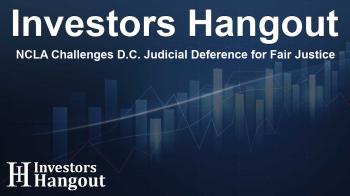NCLA Challenges D.C. Judicial Deference for Fair Justice

NCLA Challenges D.C. Judicial Deference for Fair Justice
The New Civil Liberties Alliance (NCLA) actively opposes a recent judicial mandate in D.C. that severely undermines the independence of the judiciary. By filing an amicus brief along with the Goldwater Institute in a pivotal case, NCLA urges the District of Columbia Court of Appeals to eliminate the newly imposed "Deference Amendment" from the District's Administrative Procedure Act. This amendment demands that courts defer to the Mayor and corresponding administrative agencies regarding their interpretations of the law during legal proceedings.
Understanding the Deference Amendment
This amendment signifies a troubling shift, permitting bureaucratic interpretations to overshadow judicial authority. The prior standard established by Chevron deference required courts to defer only when the law was ambiguous. In stark contrast, the Deference Amendment mandates judges to surrender their judicial duties regardless of the clarity of the law, undermining the very essence of judicial checks and balances.
The Impact of Administrative Control
What does this mean for the average citizen? It means that when individuals contest decisions made by government authorities, they are not guaranteed an unbiased legal review. Instead, the government can effectively act as both the judge and the party advocating for specific outcomes. NCLA’s statement emphasizes that allowing bureaucrats to interpret laws endangers due process and the fairness that citizens are entitled to expect from their legal system.
The Call for Judicial Restoration
NCLA highlights the critical necessity of maintaining the judiciary's independence to ensure that justice is served for all. This sentiment echoes strongly in the statements released by NCLA's legal experts, who point out that the District Council is attempting to create legal frameworks beyond its authority by usurping the judicial power granted to the courts.
Quote from NCLA Experts
Daniel Kelly, Senior Litigation Counsel at NCLA, remarked on this issue, stating, "The District Council took the power to ‘say what the law is' away from the District's courts and handed it to the Mayor and her administrative agencies. The Court of Appeals must reject this poaching of judicial power and restore D.C. residents' right to fair and impartial court proceedings." This clarion call emphasizes the organization's determination to uphold civil liberties and due process.
Constitutional Implications
The Deference Amendment's introduction raises significant constitutional concerns as well. It conflicts with both the D.C. Court Reorganization Act of 1970 and the Home Rule Act of 1973, which designate the authority of judicial interpretation exclusively to the courts. By permitting administrative entities to dictate judicial outcomes, the amendment fundamentally alters the intended structure of governmental power.
Expert Insights
In a strong statement, John Vecchione, another Senior Litigation Counsel at NCLA, commented, "Chevron deference deforms the role of judges and is contrary to our Constitution. It is no more acceptable as a legislative construct than as a judicial doctrine." Vecchione’s words encapsulate the broader implications of this power shift on American democracy and judicial integrity.
Looking Forward
Mark Chenoweth, President of NCLA, also voiced his concerns, clarifying that, "The District's judicial power was vested in its judges, not in the District Council. The Council has no right to wrest away that power—and the District's judges would be crazy to let the Council get away with doing so." This resistance is crucial in ensuring that the rule of law prevails and that the rights of residents are protected.
Key Takeaway
The ongoing legal fight by NCLA represents a critical moment for judicial independence in D.C. As regulatory bodies attempt to extend their reach into the realm of judicial functions, it is imperative for citizens and their representatives to stand for constitutional freedoms. This battle is not just about legal interpretations; it is about ensuring fairness, due process, and justice within the governance framework.
Frequently Asked Questions
What is the Deference Amendment?
The Deference Amendment is a new legal mandate that requires courts to defer to administrative agencies' interpretations of the law, regardless of ambiguity or silence in the statute.
Why is the NCLA opposing this amendment?
NCLA opposes the amendment as it undermines judicial independence and denies citizens the right to an impartial adjudicator when contesting government actions.
How does this impact citizens?
The amendment jeopardizes the due process of law, allowing government entities to act as judges in their cases, thus compromising fair legal remedies for individuals.
What are the constitutional concerns with the amendment?
The amendment conflicts with established acts that reserve judicial power for the courts, threatening the separation of powers crucial for maintaining democracy.
Who is involved in challenging the D.C. mandate?
NCLA is leading the legal challenge alongside the Goldwater Institute, aiming to uphold the rights of citizens against bureaucratic overreach.
About The Author
Contact Lucas Young privately here. Or send an email with ATTN: Lucas Young as the subject to contact@investorshangout.com.
About Investors Hangout
Investors Hangout is a leading online stock forum for financial discussion and learning, offering a wide range of free tools and resources. It draws in traders of all levels, who exchange market knowledge, investigate trading tactics, and keep an eye on industry developments in real time. Featuring financial articles, stock message boards, quotes, charts, company profiles, and live news updates. Through cooperative learning and a wealth of informational resources, it helps users from novices creating their first portfolios to experts honing their techniques. Join Investors Hangout today: https://investorshangout.com/
The content of this article is based on factual, publicly available information and does not represent legal, financial, or investment advice. Investors Hangout does not offer financial advice, and the author is not a licensed financial advisor. Consult a qualified advisor before making any financial or investment decisions based on this article. This article should not be considered advice to purchase, sell, or hold any securities or other investments. If any of the material provided here is inaccurate, please contact us for corrections.

